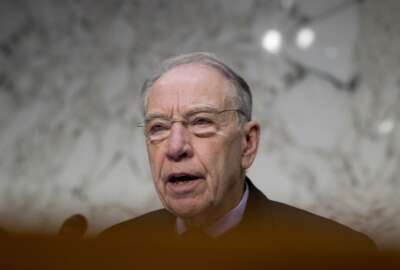
These serial appointees just can’t stay away
Two long serving appointees notch their next positions.
Political appointees come and go. For career people, that can be desirable or spark a “thank the Lord that one’s gone!” response.
In my 43-year (so far) professional career, I’ve always found it’s best to make your own relationship with new bosses. That is, ignore their reputations or what people have said about them. I can think of two long-ago bosses others loathed and never stopped complaining about. I was lucky or skillful enough to forge my own connections and ended up with mutual trust, even affection that lasted well beyond the time I worked for them.
True, sociopaths and mean people do get into positions of authority. They’re rare, though, and usually implode on their own.
I say this as preamble. Two highly able appointees have new visible federal jobs this week. Both could make oodles more money in the private sector. Yet they gravitate to public service. Those in the technology staff at the Homeland Security Department and those freshly into the new Special Inspector General for Pandemic Recovery now have remarkable new bosses.
Karen Evans just started at DHS as chief information officer, Brian Miller the head of SIGPAR. A little background on both.
First, Brian Miller, who moves over from the White House Counsel’s office. I met Miller once, and he was a guest on my show some years back. One-on-one he is cordial, informed, and direct. In recent weeks he’s been portrayed in some of the big media as a Trump partisan who won’t investigate anything that would embarrass the administration.
Last month, for instance, the New York Times portrayed Miller as such. He’d bluntly turned down requests for information from the Government Accountability Office having to do with the Ukraine aid question. It quoted Senator Chris Van Hollen (D-Md), in connection to Miller’s nomination as SIGPAR: “The role of an inspector general is to protect the public interest — not the interest of one man.”
Van Hollen is correct in that statement. But, Senator, I predict Miller will be no pushover when investigating, for instance, how the Trump administration’s Small Business Administration dealt with a trillion-odd dollars in stimulus loans.
I remember Miller’s nine-year stint as inspector general at the General Services Administration. In one famous incident that still resonates, Miller clashed with the Bush administration’s GSA head, Lurita Doan. Doan was no slouch either, but rather a shrewd and successful businesswoman. The two feuded, in part over Doan’s assertion that whistleblowers in Miller’s IG shop had gotten short shrift. She tried to cut the IG budget. Finally the whole thing became too much for the White House, which ended up firing Doan. The deliverers of the bad news told Doan she’d become a distraction.
That serious whistleblower charges resulted in one IG staff member assigned to obscure detail in another department should be at least a cautionary signal. Miller has been charged with overbearing tactics. As Federal News Network reported in 2014, Miller wrung a billion dollars in penalties from vendors over price reduction clause violations, using the False Claims Act. This when many in federal contracting circles thought it was time to retire the clause altogether.
Miller’s investigation of the GSA’s conference spending is also legendary. The extravagance, boneheadedness, and arrogance in planning the 2010 Western Regions Conference practically ended all federal conferences. The spending surfaced during the Obama administration. And it forced the resignation of another GSA administrator, even though the earnest Martha Johnson had nothing to do with it, and in fact had launched an investigation on her own.
But some who lost their jobs were later reinstated by the Merit Systems Protection Board, fueling suspicion that IG Miller had been unfair.
There are other Miller stories, such as an IG staff member banging on career officials’ hotel doors late at night demanding interviews then and there. One we posted a picture a picture of Miller showing Johnson around GSA. The photo showed them looking at a wall covered with framed pictures of people. One wag wrote a gag caption of Miller saying, “And this is where I’ll hang your head.”
Perhaps with occasional overreach, perhaps with occasional heavy-handedness, I think Miller will act independently of the White House in the SIGPAR job. We can expect some tough reports. A trillion dollars committed in nine weeks — nobody does that with perfection.
At Homeland Security, expect Karen Evans as CIO to set clear priorities and hold people accountable to get them done. I know and like Evans, having interviewed her in several jobs going back to the Bush administration. A long time career civil servant, she’d been the Energy Department’s CIO before moving into appointee ranks at the Office of Management and Budget. She was named to a position then called the administrator of e-government and IT. Today it’s called the federal CIO. She received high marks from those close to Bush.
I heard from several agency tech officials in those days about how formidable Evans could be. She’d done their job. She knew policy and the President’s Management Agenda cold.
After leaving, Evans became the national director of the U.S. Cyber Challenge.
Evans returned to government under the Trump administration as assistant secretary for Cybersecurity, Energy Security and Emergency Response, or CESER. Someone with knowledge of the situation told me Evans was abruptly let go because she said something a higher up, perhaps Energy Secretary Dan Brouilette, didn’t like. In some circumstances, I consider that a badge of honor. Evans is in fact blunt and outspoken — but hard to challenge on the facts. Or how to get things done in the federal bureaucracy.
Nearly Useless Factoid
By Alazar Moges
Up until 1971 the Postmaster General used to be in the presidential line of succession to the Presidency. Although last in the line of succession, it was an official cabinet role putting it level with many other powerful positions.
Source: Reader’s Digest
Copyright © 2024 Federal News Network. All rights reserved. This website is not intended for users located within the European Economic Area.
Tom Temin is host of the Federal Drive and has been providing insight on federal technology and management issues for more than 30 years.
Follow @tteminWFED
Related Stories





